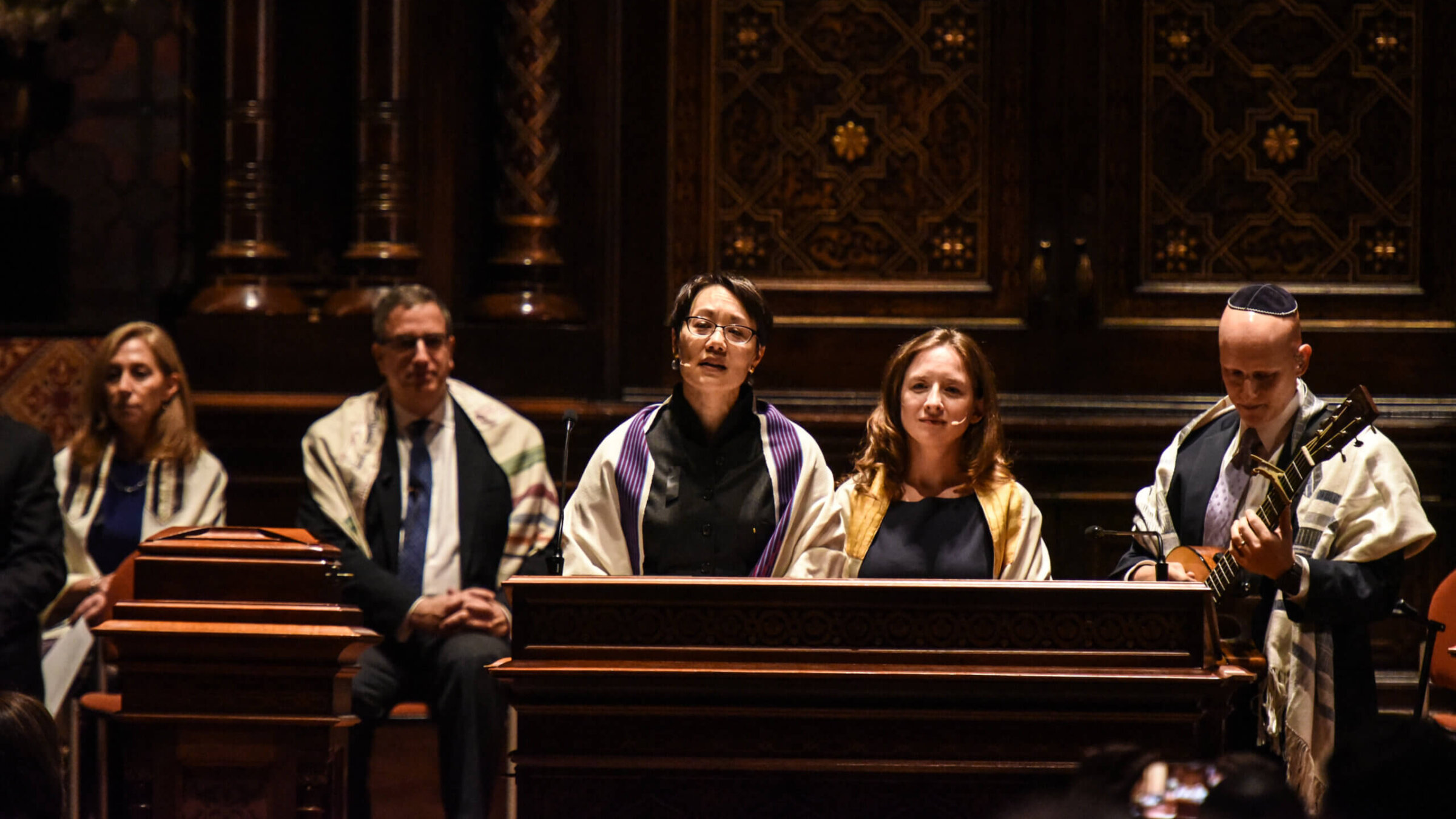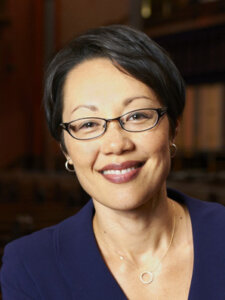‘The awe of interconnectedness:’ Rabbi Angela Buchdahl on the worst day of her life, and the redemptive power of wonder
As the first rabbi to speak at Stanford’s Baccalaureate in 20 years, Buchdahl recalled the terror of the Colleyville hostage crisis — and how awe helped her survive that day

Rabbi Angela Buchdahl (center) speaks at New York’s Central Synagogue in 2018. Photo by Stephanie Keith/Getty Images
Editor’s note: The following essay was adapted from Rabbi Angela Buchdahl’s speech at Stanford’s 2023 Baccalaureate, a keystone of its graduation celebrations.
In the Jewish tradition, we have a blessing for every occasion — including seeing a huge gathering of people. So I open with that blessing. Baruch Atah Adonai Eloheinu Melech HaOlam, chacham ha-razim: Blessed are you, Eternal One, the knower of secrets.
Just when you might feel anonymous in a mass of people like this, this blessing reminds us that someone knows your innermost heart. And in the spirit of revealing secrets, I will let you in on my own.
I suspect that I was invited to speak here today because of the worst day of my life.
Listen to That Jewish News Show, a smart and thoughtful look at the week in Jewish news from the journalists at the Forward, now available on Apple and Spotify:
On Jan. 15, 2022, I received a phone call from a rabbi in Colleyville, Texas. He and three others were being held at gunpoint by a man who came from England, hoping to free a notorious terrorist held in a federal prison down the road.
The gunman insisted on talking to me. When I got on the phone, he said I had an hour to deliver that prisoner to the Colleyville synagogue. Or else. When I told him I might need more time, he parroted an age-old antisemitic trope about Jewish power and influence: “You run the biggest synagogue in New York, just make a few phone calls.”
“Remember,” he said, “I love death more than you love life.”
My legs buckled. I had just heard the sound of a very dark heart. I felt a tremendous responsibility for four people’s lives, and utterly powerless.
But over the course of that day, I also felt something else.
I felt awe.
I was awed by the steadiness of the rabbi, who kept the gunman from shooting for over 10 hours, then threw a chair at just the right moment, letting the captives escape with their lives. By the selflessness of the hostages, who — when the gunman allowed one of them to go — made sure that the one they knew couldn’t run was freed. By their sense of humor, especially the only non-Jewish hostage who said, “If I get out of this alive, I’m definitely going to convert.”
Now, rabbis are not usually in the hostage-negotiation business. But we are in the awe business.
Dacher Keltner, a professor at Berkeley, recently wrote a beautiful book on the science of awe. He surveyed thousands of people from 26 countries and found there were eight things that consistently inspired the most awe, including music, religious experience, birth and death.
These wonders are all a regular part of my work.
But Keltner found that that the No. 1 source of awe for all people, across all cultures, was a transcendent goodness he called “moral beauty” — the exceptional acts of courage, sacrifice, resilience and kindness seen not only in moments of crisis, but also in the more everyday struggles of being human.
It turns out that our greatest source of awe is other people.
Why does awe matter?
The 20th century philosopher Rabbi Abraham Joshua Heschel said: “Our goal should be to live life in radical amazement … to get up in the morning and look around at the world in a way that takes nothing for granted … To be spiritual is to be amazed.”
I would argue that awe is the most important religious stance. Now, there has been a lot of research bemoaning the fact that your generation is the least religious in American history. I don’t necessarily worry if your generation doesn’t have religion.
But I do worry if you are going through life without wonder and awe.
I remember the day I passed a college-age student in Central Park wearing a T-shirt that read: “Born Bored.” I wanted to pull her under the blossoming cherry tree she was walking past and yell: “You were not born bored! No one is! Look up!”
Even if you’re not under a beautiful tree — even if you are in the ugliest place in the world, physically or emotionally — you can still summon these feelings, once you wake up to the fact that your unlikely, beautiful existence is worthy of awe.
Stanford is an essential part of my story. My father was admitted here in the late 1950s, back when Stanford actively suppressed Jewish admissions.
His family had fled the pogroms of Eastern Europe in the early 20th century. They found their way to Tacoma, Washington, because they were woodworkers, and the Pacific Northwest was where the trees were.
But after the post-WWII building boom, the family business struggled. So after two years at Stanford, my father came home to the University of Washington, because he could no longer afford Stanford tuition.
But the pull of this place was too great. He returned senior year by taking out loans, and he signed up for ROTC to pay them back. The Army stationed my father in South Korea. There, in his first year, he was invited to speak to a group of Korean students about college life in America.
He caught my Mom’s attention. They came from radically different families, cultures and faiths, but somehow love prevailed. They married, had two girls in Seoul, then moved back to Tacoma.
As we grew up, my father didn’t hide his wish to see his kids at a Stanford graduation, and my younger sister fulfilled that dream, graduating in 1997. I’m so grateful that both my parents, my sister and her family are all here to see me on this podium today. I may be here because a deranged gunman from England thought I was the chief rabbi of America. But as a biracial, immigrant Korean, with a Buddhist mother, raised in a tiny Jewish community, even that wild delusion is radically amazing to me.
A much bigger design
There are powerful, mysterious forces and systems that have changed the course of my life, in ways I can’t always comprehend.
My parents were married in 1968, only one year after Loving v. Virginia made interracial marriage legal in every state. I was born in 1972, the year that the first female rabbi was ordained, and a year when Yale University admitted only one woman for every seven men. That same year, Congress enacted Title IX, forcing schools across the country to bring equity for women. Yale came to parity barely a decade before I arrived on campus.
I immigrated from Korea to the U.S. in the mid-1970s, just as Judaism’s Reform Movement changed its attitude toward interfaith families like mine, from a stance of outright rejection to one of outreach and inclusion.
I still grew up being told I couldn’t really be Jewish with a face like mine. I spent a lot of my early years shuffling between Korea and America, trying to fit in — to belong, somewhere. And I still hit a stained-glass ceiling when I applied to lead my congregation, with questions of how I would handle the job with my three children, and whether I had the “gravitas.”
I overcame those challenges and prejudices to become the first Asian American rabbi ever ordained in North America, and the first woman to lead my congregation in its 180-year history. I feel proud of the work I have done. But I didn’t do it alone. I stand on the shoulders of courageous rabbis, feminist activists, brilliant lawyers, wise policymakers and visionary dreamers who smashed ceilings, changed laws and transformed cultures, enabling my very existence.
Consider for a moment the stories of your own families and communities. Those who fled persecution and war, who sacrificed their dreams for the sake of the next generation. Those who were segregated, denied a job, a home, a vote. Those who couldn’t pursue their own ambitions because of their race, or gender, or who they loved.
Every one of us owes our very being to people who came before us. We know that some of them are here with you now. And many more are not here, or nameless. But in this moment, you are the fulfillment of everything they ever worked for.
How awe-inspiring is that?
The sublime and beautiful
So, I urge you: Look up, and look around. But don’t forget to also look inside.
Judaism teaches that each person is an entire world. Every one of you is here to do your part for something that is more lasting and significant than yourself. What you create will ripple out from you into the world in ways you cannot possibly imagine.
The vastness of awe can make you feel very small. But it also calls you to transcend yourself – to achieve, in Dacher Keltner’s words, moral beauty.
Remember: You are the greatest source of awe in the world.
My hope for you is that you live your life with radical amazement every day. To find the sublime and beautiful, even in the quiet and mundane — and most of all, in the people around you. Understand that awe is not just a byproduct of an experience, like today. Awe can be a guiding orientation for a life of meaning, connection and joy.
Feel the awe of interconnectedness. Reach back to your family and friends. And reach back to all your ancestors, who make it possible for you to be here. Awaken your hearts to the awe you feel when you look inside.
Thank you. And congratulations.

















